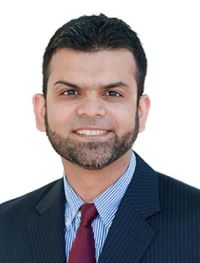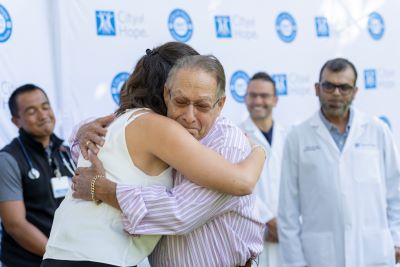In 2019, Paul Rudder, then 72, wanted to donate blood as he had done on a regular basis for many years. But when his blood was checked before donation, a test showed that he had low hemoglobin levels.
Rudder was surprised to learn that, since he felt healthy.
“I was kind of taken aback,” he recalled. “I’d never had my blood refused before.”
He had more tests done before he received a diagnosis of myelofibrosis, a rare bone marrow cancer that can turn into leukemia.
“I didn’t have any obvious symptoms,” said Rudder, now 77, a Mammoth Lakes attorney and investor and an avid skier. “I don’t think I was really able to take in the enormity of it. To have somebody tell you you have a life-threatening illness, out of the blue like that, it was quite shocking.”
The oncologist who gave him the diagnosis told him he didn’t treat a lot of patients with myelofibrosis. Rudder knew he had to find a place that specialized in treating patients with rare blood cancers. He knew that place was City of Hope.
Haris Ali, M.D., a City of Hope hematologist-oncologist, started treating Rudder in late 2019. Rudder had high-risk myelofibrosis, meaning the disease would worsen if not properly treated. The only treatment that could cure Rudder was a blood stem cell transplant from a donor.

“We developed a very trusting relationship from the very first time I met him,” Ali recalled. “When I told him that City of Hope was one of the first programs in the world to demonstrate that myelofibrosis could be cured with a bone marrow transplant and that we continue to have very good outcomes for patients with this disease, he was receptive to having a transplant. We basically started the donor search from the very first day.”
Indeed, City of Hope’s blood stem cell and bone marrow transplant (BMT) program has performed nearly 19,000 transplants, making it one of the largest programs in the nation. City of Hope has exceptional survivor rates year after year, according to the Center for International Blood and Marrow Transplant Research.
Over the years, City of Hope has also helped pioneer several BMT innovations, including being one of the first institutions to successfully perform BMTs in older adults and one of the first worldwide to cure a patient with HIV and leukemia from those diseases. City of Hope has also had growing success with nonrelated matched donors and, most recently, half-matched family donors.
Building on its BMT expertise, City of Hope is also a pioneer in the development of chimeric antigen receptor (CAR) T cells to treat cancer. More than 1,000 patients have been treated with CAR T cell therapy at City of Hope, which is also testing how this form of cancer immunotherapy can help patients have a more successful transplant.
“City of Hope’s success treating patients with the most difficult-to-treat blood cancers, such as Paul, is possible because of a dedicated staff of City of Hope doctors, nurses and other employees who are committed to ensuring the best outcomes for patients and their families with the utmost care and compassion,” said Ryotaro Nakamura, M.D., Jan & Mace Siegel Professor in Hematology & Hematopoietic Cell Transplantation and director of City of Hope’s Center for Stem Cell Transplantation.
BMTs are also possible because of the donors who give patients the gift of life.
“Once people get well and go back to their regular lives, to see them celebrating with their children and grandchildren, going to graduations and weddings, bar mitzvahs, baby namings, baptisms, we share in those moments and they never get old,” said Stephen J. Forman, M.D., director of City of Hope’s Hematologic Malignancies Research Institute. “We share in everyone’s joy year after year.

For Rudder, Ella Sade, 25, of Israel is who made more of those moments possible. In 2017, Sade registered to be a bone marrow donor, which is a requirement when a person joins the Israeli army. In late 2019, Sade had finished serving in the army when she was contacted by Ezer Mizion, the world’s largest Jewish bone marrow registry, to let her know there was a cancer patient in the United States who needed her blood stem cells.
“My donation ended up on the other side of the world,” Sade said. “It was very exciting to be able to be chosen, to be found eligible to do this and to give hope to his family and life to this man. For me, this was the most natural thing to do.”
Sade didn’t hear about the patient again until City of Hope contacted her over the summer to take part in its 2023 BMT Reunion. Each year, a patient or two are invited to City of Hope to meet the donors who saved their lives. The reunion, which drew thousands of people before the pandemic and features a picnic, entertainment and other festivities, was held virtually for the first two years of the pandemic and then partly in person and partly via video in 2022 and 2023.
Rudder and Sade were chosen as the patient and donor who would meet for the first time for this year’s 47th reunion. Sade and her mother, Nomi, traveled to the U.S. for the first time in their lives to meet Rudder and his wife, Kathleen, in early September.
Tears flowed as they were surrounded by Ali and other City of Hope doctors and nurses who helped care for Rudder. Rudder hugged Sade tightly after he met her.
“Thank you, thank you from every cell that I’ve got,” he said. “I’m so thrilled to be here with you. Thank you for coming all this way, and thank you for letting me continue to live. I owe you my life.”
Main image, left to right: Kathleen Rudder, Paul Rudder, Ella Sade, Nomi Sade and Stephen J. Forman, M.D.